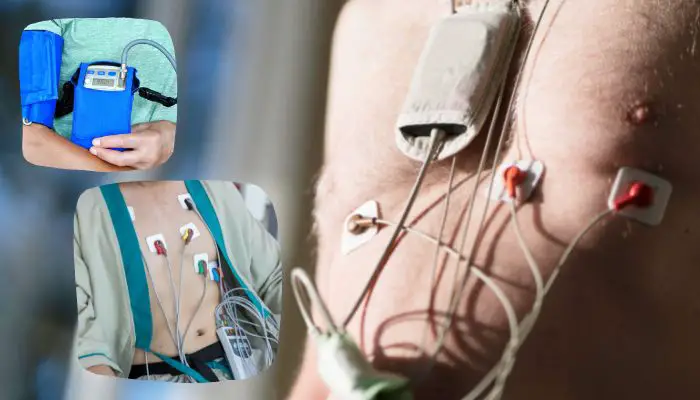A Holter monitor is a small, discreet gadget worn on the wrist that records your heart rhythm. You can advise to wear a Holter monitor for one to two days by your doctor. The device captures all of your heartbeats during that time.
A Holter monitor test may be performed if your doctor determines that an electrocardiogram (ECG) does not provide enough information regarding the state of your heart.
The device is intended to monitor and record your heartbeats. Certain circumstances may necessitate sleeping with a Holter monitor.
It may feel strange to sleep with it. At first, individuals may have concerns about sleeping with a cardiac monitor. At first, wearing a heart monitor with wires and electrodes can be uncomfortable. The most common question about wearing a Holter monitor is How to Sleep With Holter Monitor?
Your doctor will use the Holter monitor data to determine if you have a cardiac rhythm disorder. If normal Holter monitoring fails to detect an irregular heartbeat, your doctor may recommend a longer-term monitor that can record your heartbeat for many weeks.
When Is a Holter Monitor Used?
If you have signs such as dizziness, fainting, low blood pressure, persistent exhaustion (tiredness), or palpitations and a resting ECG does not reveal a clear explanation, your healthcare provider may order a Holter monitor ECG.
Occasionally, certain arrhythmias may occur. Alternatively, they may occur exclusively under specific circumstances, such as stress or activity. These arrhythmias are difficult to detect on an office ECG.
As a result, the healthcare professional may request a Holter monitor to capture any irregular heartbeats or rhythms causing the symptoms.
Is It Possible to Sleep While Wearing a Holter Monitor?
Even for a couple of days, wearing a heart monitor is not enjoyable. Fortunately, because a Holter monitor is a small wireless gadget, sleeping with one is a quite pleasant experience.
The heart monitor is completely painless and noninvasive. Some individuals have difficulty sleeping while wearing one. Inability to sleep can be stressful and have repercussions the next day.
Regrettably, there may be occasions when you must sleep with a Holter monitor. So, you should be aware of How to Sleep With Holter Monitor? For some people, sleeping with a cardiac monitor may be slightly uncomfortable.
- You should know the type of medical gadget the Holter monitor is and what it may feel like to sleep with it on.
- Even if you’re compelled to wear a cardiac monitor for a few days, it’s not unbearably painful.
- The device is not painful to wear.
- The Holter monitor is a compact, battery-powered device that fits comfortably in your pocket.
- The screen is roughly the size of a smartphone.
- Patches, wires, and electrodes link it to your chest. The data from the cardiac monitor will assist your doctor in determining the best course of treatment for you.
How to Sleep With Holter Monitor?

It is usual for your doctor to request that you sleep with a Holter monitor attached. It’s beneficial to be as relaxed as possible. Insomnia can be a result of stress, anxiety, and concern.
Finding ways to unwind should aid in sleeping while wearing a Holter monitor. It can be beneficial before bed to help alleviate anxiety and prepare you for sleep by assisting you in “calming down” after the day’s pressures.
When you’re having problems falling asleep, one approach is to take a sleeping tablet prescribed by your doctor. On the other hand, taking sleeping medications may not be the greatest long-term answer.
Fortunately, some natural alternatives may assist you in falling asleep while wearing a Holter. Because not all methods are equally beneficial for everyone, it’s best to experiment to determine which ones work best for you.
Advantage of Continuous Holter Monitoring
It is one advantage of Holter monitoring continually. The monitor can capture the event as it occurs, assisting clinicians in diagnosing the underlying problem. Additionally, you can use the Holter device to monitor persons who have been diagnosed with cardiac disease as they go about their regular lives.
Generally, this arrangement is more comfortable for the patient than lengthy hospital stays. Additionally, a doctor may request 24-hour Holter monitoring to assess a patient’s reaction to heart disease drugs.
Is It Possible to Switch Off the Heart Monitor During Sleeping?
Please consult your physician to determine whether it is safe to turn off your cardiac monitor while you sleep. People are bothered by the heart monitor’s vibration. It is advisable to place the monitor on a cushioned surface to avoid being woken up in the middle of the night by the vibration.
Optimal Sleeping Postures While Using Holter Monitor
Sleeping on Stomach
Your sleeping position has a significant impact on the overall quality of your sleep. If sleeping on your back is uneasy for you, you may want to try sleeping on your stomach.
The patches, electrodes, and wires rubbing against your chest may be your first concern. However, if you are accustomed to sleeping on your stomach, you may fall asleep and stay asleep more quickly and comfortably in this position.
Individuals who normally sleep on their stomachs should attempt to maintain that position while wearing a cardiac monitor. It is conceivable, even with the entirety of the Holter monitor components. It’s worth a shot.
The Holter monitor is a compact gadget. You can position the device next to you on the bed to hide most of the cords. You should not be concerned about the patches and wires falling loose during the night. Because the patches and electrodes are securely bonded, they should remain attached even if you sleep on your stomach.
Sleeping on One’s Side
The most common sleeping posture is on one’s side. Sleeping on your left side may help reduce heartburn, acid reflux and promote circulation. If you snore, this is an excellent sleeping posture.
For someone who wants to sleep with a body pillow, sleeping on the side is the default posture. However, you might use a standard pillow to assist you with sleeping on your side.
Sleeping on Back
Sleeping on your back may be the greatest alternative if you are compelled to sleep with a cardiac monitor. When you sleep on your back, the electrodes on your chest are not an issue. The Holter monitor can be clipped to the waistband of your pyjamas or worn on your side.
The least bothersome option may be to sleep on your back while wearing a heart monitor. It may least patches and wires intrusive in this sleeping posture. Adjusting sleep positions may be difficult if you are not a back sleeper by nature.
The following suggestions may assist you in sleeping on your back:
- Utilize many cushions to maximize your comfort.
- Consider placing a pillow beneath your legs as an experiment. The pillow beneath your leg may assist you in sleeping on your back.
- While sleeping on your back, you may be unaware of the Holter monitor. Relax to assist you in falling asleep quickly.
Precautions While Sleeping With a Holter Monitor
A Holter monitor is a highly sensitive instrument. To safeguard it, avoid the following when sleeping:
- Place the Holter monitor next to you in bed. The objective is to avoid dozing off on the monitor.
- Maintain a minimum of six inches between your smartphone and tablet computer and your chest area.
- Sleeping with an electric blanket is not recommended.
- Keep magnets away from your body.
Should I Try to Get a Full Night’s Sleep While Wearing the Holter Monitor?
Resting comfortably while wearing the Holter monitor is crucial. Since we want to know how your heart rate changes as you go about your typical day, we need to keep tabs on you for at least 24 hours straight, even when you’re sleeping.
It necessitates that you stick to a very regular routine, including when you wake up and go to bed. If you’re using a Holter monitor, you shouldn’t have to make any special preparations to sleep. To be safe, nevertheless, some practice is recommended.
In some situations, you may need to wear the Holter monitor for longer than 12 or 48 hours, possibly weeks.
It’s been almost 15 years since my brother had to wear the Holter monitor for 24 hours. The Holter monitor was a massive contraption at the time, giving him a bad night’s rest.
These days’ smaller devices are a plus. Thankfully, technological advancements have resulted in significantly smaller and lighter Holter monitors. In addition, it is a silent gadget.
The wires, patches, and noticeable presence of the Holter monitor can make it difficult to fall asleep. In addition, it may be disheartening to consider your next steps once you have the data in hand.
If you are confused about how to use the device, consult your doctor or nurse. They are well-versed in the intricacies of sleeping with a Holter monitor and can advise you on how to handle it during your required wear period. Let them know how you feel and what worries you the most. They will almost certainly have valuable suggestions to provide.
Frequently Asked Question
How Do You Sleep With a Holter Monitor?
It is ideal to sleep in a posture that does not pressure the chest electrodes or the associated wires. If any of these wires become loose or detached, reconnect the wire and firmly push the electrode against the skin.
Can You Lay on Your Stomach With a Heart Monitor?
Unless your doctor advises otherwise, it is acceptable to switch off the monitor while you sleep if it is causing you continual discomfort. If you’re unable to do so, I recommend placing the monitor on a cushioned surface to avoid the device’s vibration from awakening you.
Can You Drink Coffee While Wearing a Holter Monitor?
While taking the test, the individual will continue to attend school or work as usual. Additionally, a doctor may advise patients to minimize their alcohol and caffeine use. Individuals should keep track of their everyday activities and any symptoms they experience.
Conclusion
Fortunately, technology has advanced, and Holter monitors are now significantly smaller and lighter. Even yet, sleeping well with a Holter monitor may be challenging due to the wires, patches, and, of course, the device itself. Additionally, contemplating what will happen once you receive the results might be frustrating.
It will also discuss safety concerns and possible sleeping positions when using a Holter monitor while sleeping. If you experience any discomfort while using the device, remember to seek guidance from your doctor and nurses.
Read Also:

